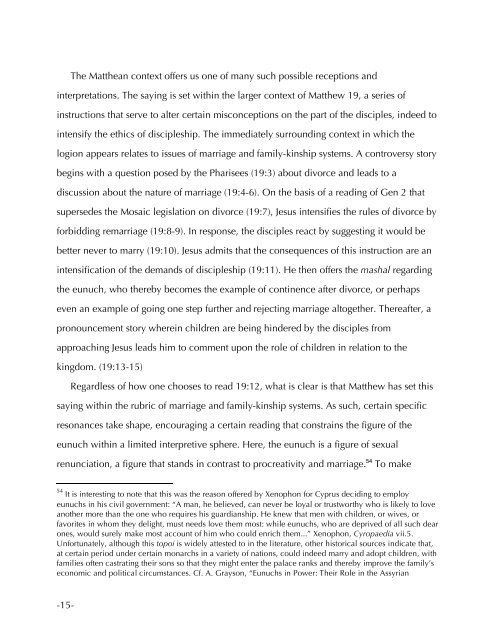-1- Eunuchs and the Postgender Jesus: Matthew 19:12 and ...
-1- Eunuchs and the Postgender Jesus: Matthew 19:12 and ...
-1- Eunuchs and the Postgender Jesus: Matthew 19:12 and ...
You also want an ePaper? Increase the reach of your titles
YUMPU automatically turns print PDFs into web optimized ePapers that Google loves.
-15-<br />
The Mat<strong>the</strong>an context offers us one of many such possible receptions <strong>and</strong><br />
interpretations. The saying is set within <strong>the</strong> larger context of Mat<strong>the</strong>w <strong>19</strong>, a series of<br />
instructions that serve to alter certain misconceptions on <strong>the</strong> part of <strong>the</strong> disciples, indeed to<br />
intensify <strong>the</strong> ethics of discipleship. The immediately surrounding context in which <strong>the</strong><br />
logion appears relates to issues of marriage <strong>and</strong> family-kinship systems. A controversy story<br />
begins with a question posed by <strong>the</strong> Pharisees (<strong>19</strong>:3) about divorce <strong>and</strong> leads to a<br />
discussion about <strong>the</strong> nature of marriage (<strong>19</strong>:4-6). On <strong>the</strong> basis of a reading of Gen 2 that<br />
supersedes <strong>the</strong> Mosaic legislation on divorce (<strong>19</strong>:7), <strong>Jesus</strong> intensifies <strong>the</strong> rules of divorce by<br />
forbidding remarriage (<strong>19</strong>:8-9). In response, <strong>the</strong> disciples react by suggesting it would be<br />
better never to marry (<strong>19</strong>:10). <strong>Jesus</strong> admits that <strong>the</strong> consequences of this instruction are an<br />
intensification of <strong>the</strong> dem<strong>and</strong>s of discipleship (<strong>19</strong>:11). He <strong>the</strong>n offers <strong>the</strong> mashal regarding<br />
<strong>the</strong> eunuch, who <strong>the</strong>reby becomes <strong>the</strong> example of continence after divorce, or perhaps<br />
even an example of going one step fur<strong>the</strong>r <strong>and</strong> rejecting marriage altoge<strong>the</strong>r. Thereafter, a<br />
pronouncement story wherein children are being hindered by <strong>the</strong> disciples from<br />
approaching <strong>Jesus</strong> leads him to comment upon <strong>the</strong> role of children in relation to <strong>the</strong><br />
kingdom. (<strong>19</strong>:13-15)<br />
Regardless of how one chooses to read <strong>19</strong>:<strong>12</strong>, what is clear is that Mat<strong>the</strong>w has set this<br />
saying within <strong>the</strong> rubric of marriage <strong>and</strong> family-kinship systems. As such, certain specific<br />
resonances take shape, encouraging a certain reading that constrains <strong>the</strong> figure of <strong>the</strong><br />
eunuch within a limited interpretive sphere. Here, <strong>the</strong> eunuch is a figure of sexual<br />
renunciation, a figure that st<strong>and</strong>s in contrast to procreativity <strong>and</strong> marriage. 54 To make<br />
54 It is interesting to note that this was <strong>the</strong> reason offered by Xenophon for Cyprus deciding to employ<br />
eunuchs in his civil government: “A man, he believed, can never be loyal or trustworthy who is likely to love<br />
ano<strong>the</strong>r more than <strong>the</strong> one who requires his guardianship. He knew that men with children, or wives, or<br />
favorites in whom <strong>the</strong>y delight, must needs love <strong>the</strong>m most: while eunuchs, who are deprived of all such dear<br />
ones, would surely make most account of him who could enrich <strong>the</strong>m...” Xenophon, Cyropaedia vii.5.<br />
Unfortunately, although this topoi is widely attested to in <strong>the</strong> literature, o<strong>the</strong>r historical sources indicate that,<br />
at certain period under certain monarchs in a variety of nations, could indeed marry <strong>and</strong> adopt children, with<br />
families often castrating <strong>the</strong>ir sons so that <strong>the</strong>y might enter <strong>the</strong> palace ranks <strong>and</strong> <strong>the</strong>reby improve <strong>the</strong> family’s<br />
economic <strong>and</strong> political circumstances. Cf. A. Grayson, “<strong>Eunuchs</strong> in Power: Their Role in <strong>the</strong> Assyrian


